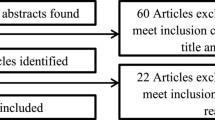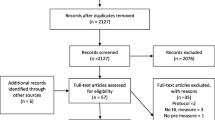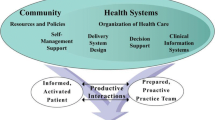Abstract
Objectives
We aimed to assess the feasibility of implementing, within Australian general practice, an innovative disease management program for hypertension. The central platform of this program is an information communication technology package for risk assessment and management, access to a dietitian commissioned by the program and a tailored set of audiovisual and written material.
Methods
We carried out a pilot cluster randomized controlled trial (stratified for rurality) of 67 general practices (including 371 patients) across two Australian states. Our primary hypothesis was that a disease management program would improve the cardiovascular risk score in patients with mild to moderate hypertension, compared with that of patients being treated according to current clinical practice. Analysis was by intention to treat.
Results
There was a borderline significant favorable treatment effect of the disease management program on the cardiovascular risk score of 4.6 percentage points (95% CI -9.7, 0.6) (theoretical range: 0–100%) at 6 months. At 12 months there was a non-statistically significant effect of approximately 2 percentage points. The proportion of patients achieving the target blood pressure of ≤130/85mm Hg was modest at between 20% and 30%. There was no treatment effect of the disease management program on this outcome at 6 months and a treatment effect favoring the control group was seen at 12 months (difference = −11.6%; 95% CI —21.1, −2.1). There was a modest short-term treatment effect in favour of the disease management program in terms of change in blood pressure from baseline. At 12 months follow-up, 70% of general practitioners were still accessing the program’s CD-ROM and improvements were noted for five of nine items measuring their satisfaction in relation to the provision of hypertension care. A treatment effect was found for 5 of 16 items on the patient satisfaction questionnaire at 6 months and 12 of 16 items at 12 months.
Conclusions
Disease management for hypertension incorporating information communication technologies is pragmatic in general practice and results in modest short-term health gains. More research is required to ensure feasibility over a longer period.





Similar content being viewed by others
References
Hunter DJ. Disease management: has it a future? BMJ 2000; 320: 530
Hunter DJ, Fairfield G. Managed care: disease management. BMJ 1997; 315: 50–3
Bodenheimer T. Disease management in the American market. BMJ 2000; 320: 563–6
Ezzati M, Lopez AD, Rodgers A, et al. Selected major risk factors and global and regional burden of disease. Lancet 2002; 360(9343): 1347–60
Epstein RS, Sherwood LM. From outcomes research to disease management: a guide for the perplexed. Ann Intern Med 1996; 124: 832–42
Weingarten SR, Henning JM, Badamgarav E, et al. Interventions used in disease management programmes for patients with chronic illness: which ones work? Meta-analysis of published reports. BMJ 2002; 325: 925–32
World Health Organization. Integrated management of cardiovascular risk: report of a WHO Meeting. Geneva: World Health Organization, 2002
Turnbull DA, Mensforth H, Beilby JJ, et al. An empirical model for the development of disease management programs in general practice. Dis Manage Health Outcomes 2002; 10: 723–9
Wilkinson D, McElroy H, Beilby J, et al. Uptake of health assessments, care plans and case conferences by general practitioners through the Enhanced Primary Care program between November 1999 and October 2001. Aust Health Rev 2002; 25: 1–11
Bollen MD. Recent changes in Australian general practice. Med J Aust 1996; 164: 212–5
Donner A, Klar N. Design and analysis of cluster randomization trials in health research. London: Arnold, 2000
Guidelines Subcommittee of the World Health Organization — International Society of Hypertension (WHO-ISH) Mild Hypertension Liaison Committee. 1999 World Health Organization — International Society of Hypertension Guidelines for the Management of Hypertension. J Hypertens 1999; 17: 151–83
Wing LMH, Reid CM, Ryan P, et al. A comparison of outcomes with angiotensin-converting-enzyme inhibitors and diuretics for hypertension in the elderly. N Engl J Med 2003; 348: 583–92
Fogarty JS. Reactance theory and patient non-compliance. Soc Sci Med 1997; 45: 1277–88
van der Merwe Haug D. Utilization and interaction: an exploration of processes in a new disease management program for hypertension [masters thesis]. Adelaide (SA): Department of Psychology, University of Adelaide, 2002
Kannel WB, Neaton JD, Wentworth D, et al. Overall and coronary heart disease mortality rates in relation to major risk factors in 325,348 men screened for the MRFIT Multiple Risk Factor Intervention Trial. Am Heart J 1986; 112: 825–36
National Heart Foundation of Australia. Risk Factor Prevalence Study (No. 3). Canberra: National Heart Foundation of Australia and Australian Institute of Health, 1989
Wing LMH, Reid CM, Ryan P, et al. Second Australian National Blood Pressure Study (ANBP2). Australian comparative outcome trial of ACE inhibitor and diuretic-based treatment of hypertension in the elderly. Clin Exp Physiol 1997; 19(5–6): 779–91
Huxley PJ. The GSQ Pilot Study: technical details. Manchester: Manchester University Social Work Research Unit, Department of Psychiatry, 1998
Department of Epidemiology and Preventive Medicine. Take heart assessment program. Melbourne (VIC): Monash University, 2001
Montgomery AA, Fahey T. A systematic review of the use of computers in the management of hypertension. J Epidemiol Community Health 1998; 52: 520–5
World Health Organization. Innovative care for chronic conditions: building blocks for action. Geneva: World Health Organization, 2002
Wagner EH. The role of patient care teams in chronic disease management. BMJ 2000; 320: 569–72
Acknowledgments
Funding for this study was provided by AstraZeneca Pty Ltd, Aventis Pharma Pty Ltd, Bayer Australia Ltd, and Pfizer Pty Ltd. The following roles were undertaken by the authors in conjunction with Data Management Analysis Centre at the Departments of General Practice and Public Health, the University of Adelaide: study design, data collection, analysis and interpretation, and preparation of the manuscript. The supporting sources did not control or influence the decision to submit the manuscript for publication. The views expressed in this paper are those of the authors.
The authors thank all of the study participants, including the patients, general practitioners and dietitians. Sponsor representatives on the ADAGE Management Committee are: Ms Alison Van Nooten, Clinical Projects Manager, AstraZeneca Pty Ltd; Dr Christine Smith, Health Outcomes Stream Manager, Pfizer Australia Pty Ltd; Ms Susan Hopkins, Medical Manager, Aventis Pharma Pty Ltd; and Dr Jeff Hassall, Medical Director, Bayer Australia Ltd. The data for this study were managed and analyzed by the Data Management Analysis Centre at the Departments of General Practice and Public Health, the University of Adelaide. The authors wish to thank Dr Greg Pearce for his contribution to the conceptualization of the ADAGE program and its evaluation. The authors have no conflicts of interest that are directly relevant to the content of this study.
Author information
Authors and Affiliations
Corresponding author
Rights and permissions
About this article
Cite this article
Turnbull, D.A., Beilby, J.J., Ziaian, T. et al. Disease Management for Hypertension. Dis-Manage-Health-Outcomes 14, 27–35 (2006). https://doi.org/10.2165/00115677-200614010-00004
Published:
Issue Date:
DOI: https://doi.org/10.2165/00115677-200614010-00004




